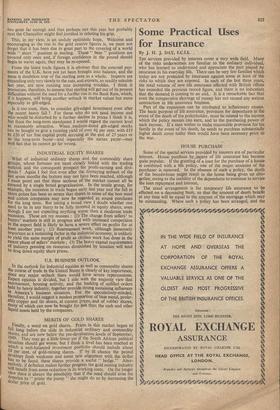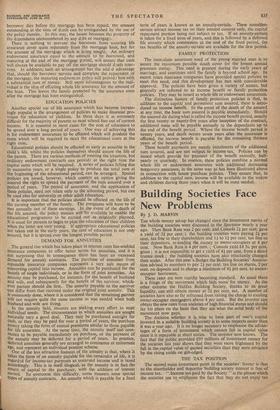Some Practical Uses for Insurance
By J. H. J. DAY,
THE services provided by insurers cover a very wide field. Many of the risks underwritten are familiar to the ordinary individual, who has learned to understand and appreciate the part played by insurance in his everyday life. There can be very few families which today are not protected by insurance against some at least of the risks to which they are exposed. In each of the last three years, the total volume of new life assurance effected with British offices has exceeded the previous record figure, and there is no indication that the demand, is coming to an end. It is a remarkable fact that even the comparative shortage of money has not caused any serious contraction in life assurance business.
Part of the expansion can be attributed to inflationary causes. The basic purpose of life assurance, provision for dependants in the event of the death of the policyholder, must be related to the income which the policy monies can earn, and to the purchasing power of such income. If a man wishes to make reasonable provision for his family in the event of his death, he needs to purchase substantially higher death cover today than would have been necessary prior to the war.
HOUSE PURCHASE Some of the special services provided by insurers are of particular interest. House purchase by, means of life assurance has become quite popular. If the granting of a loan for the purchase of a house is combined with a life policy, one of the major anxieties of the purchaser is removed. In the absence of such a policy, the death of the breadwinner might result in the home being given up alto- gether, owing to the inability of the dependants to continue to service the loan repayment and interest.
The usual arrangement is for temporary life assurance to be effected on a decreasing basis, so that the amount of death benefit at any time will be equal to the amount of the mortgage which may be outstanding. Where such a policy has been arranged, and the
borrower dies before the mortgage has been repaid, the amount outstanding at the time of death can be extinguished by the use of the policy monies. In this way, the house becomes the pi operty of the dependants unencumbered by any debt or mortgage.
There is nothing to prevent the borrower from securing life assurance cover quite separately from the mortgage loan, but for the amount of the mortgage which is being sought. An ordinary endowment assurance equal to the amount to be borrowed, and maturing at the end of the mortgage period, will ensure that cash will always be available to pay off the mortgage should death inter- vene. In addition, such an arrangement has the added advantage that, should the borrower survive and complete the , repayment of the mortgage, the maturing endowment policy will provide him with a substantial sum of money. Still more advantageous to the indi- vidual is the idea of effecting whole life assurance for the amount of the loan. This leaves the family protected by the assurance even after the mortgage has been extinguished.
EDUCATION POLICIES Another special use of life assurance which has become increas- ingly popular is the arrangement of policies to make financial pro- vision for education of children. In these days it is extremely difficult for the majority of parents to meet school fees out of current income. It is essential in most cases for the cost of education to be spread over a long period of years. One way of achieving this is for endowment assurances to be effected which will produce the sums which will be required to meet the educational .costs at the right time. Educational policies should be effected as early as possible in the child's life, whilst the policies themselves should assure the life of the parent. There are various methods of meeting the situation, but ordinary endowment contracts can provide at the right time the capital sums which will be required. A series of policies falling due in successive years, or a single policy to produce the total sum at the beginning of the educational period, can be arranged. Special policies are issued, however, which contain an option giving the assured the right to spread the payment of the sum assured over a Period of years. The period of assurance, and the application of these policies, need not relate only to the schooling period, but can be used also for university or other adult education.
It is important that the policies should be effected on the life of the earning member of the family. The premiums will have to be met annually out of these earnings. In the event of the death of the life assured, the policy monies will be available to enable the educational programme to be carried out as originally • planned. It is usual for parents to begin to plan the education of their children when the latter are very young. If appropriate educational policies are taken out in the early years, the cost of education is not only assured, but it is spread over the longest possible period.
DEMAND FOR ANNUITIES The general rise which has taken place in interest rates has enabled insurance companies to offer better terms for annuities, and it is not surprising that in consequence there has been an increased demand for annuity contracts. The purchase of annuities from reputable insurance companies represents a very safe means of converting capital into income. Annuities can be purchased for the benefit of single individuals, or in the form of joint annuities. An annuity may be purchased, for instance, for the benefit of husband and wife, and subsequently for the benefit of the survivor, which- ever partner should die first. The annuity payable to the survivor can differ from that received under the original joint annuity. This is commonly done, where it is considered that the remaining partner will not require quite the same income as was needed when both husband and wife are living. In the annuity field, insurers are making every effort to meet individual needs. The circumstances in which annuities are sought naturally vary a good deal. They may be purchased outright for cash, or they may be paid for over a period of years, the purchase money taking the form of annual premiums similar to those payable for life assurance. At the same time, the annuity itself can com- mence to be payable immediately on purchase, or the payment of the annuity may be deferred for a period of years. In practice, deferred annuities generally are arranged to commence at retirement age, and represent an individual pension scheme. One of the less attractive features of the annuity is that, where it takes the form of an annuity payable for the remainder of life, it is regarded for income-tax purposes as unearned income and is taxed accordingly. This is in itself illogical, as the annuity is in fact the return of capital to the purchaser, with the addition of interest earned. To overcome this difficulty, some insurers issue special types of annuity contracts. An annuity which is payable for a fixed term of years is known as an annuity-certain. These annuities- certain attract income tax on their interest content only, the capital repayment portion being not subject to tax. If an annuity-certain is taken for a fixed term of years, and this is followed by a deferred life annuity which commences at the end of the fixed period, the tax benefits of the annuity-certain are available for the first period.
FAMILY PROTECTION The immediate assurance need of the young married man is to secure the maximum possible death cover for the lowest annual premium outlay. This need is greatest during the early years of marriage, and continues until the family is beyond school age. In recent years insurance companies have provided special policies to meet this need, and this development has met with considerable approval. The policies have been given a variety of names, but generally are referred to as income benefit or family protection policies. They may be issued as whole life or endowment assurances.
The distinctive feature of family protection policies is that, in addition to the capital and permanent sum assured, there is intro- duced an income benefit. In the event of the death of the assured at any time, the basic sum assured is payable immediately. Should the assured die during what is called the income benefit period, usually the first twenty or twenty-five years after inception of the contract, additional sums will be payable annually to the dependants up to the end of the benefit period. Where the income benefit period is twenty years, and death occurs seven years after the assurance is effected, the income benefit is payable for the remaining thirteen years of the benefit period.
These benefit payments are merely instalments of the additional sum assured, and are not subject to income tax. Policies can be issued which provide for payment of the benefit annually, half- yearly or quarterly. In essence, these policies combine a normal whole life or endowment assurance with additional decreasing temporary assurance, in the same way as has been illustrated above in connection with house purchase policies. They ensure that, in addition to the capital sum, income will be available to the widow and children during those years when it will be most needed.



















































 Previous page
Previous page